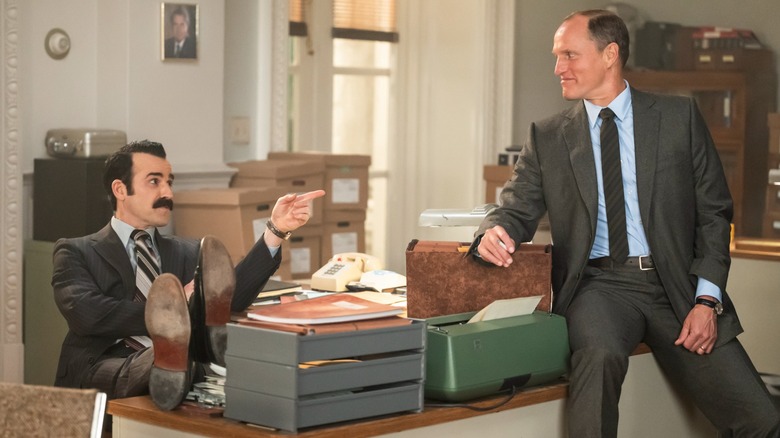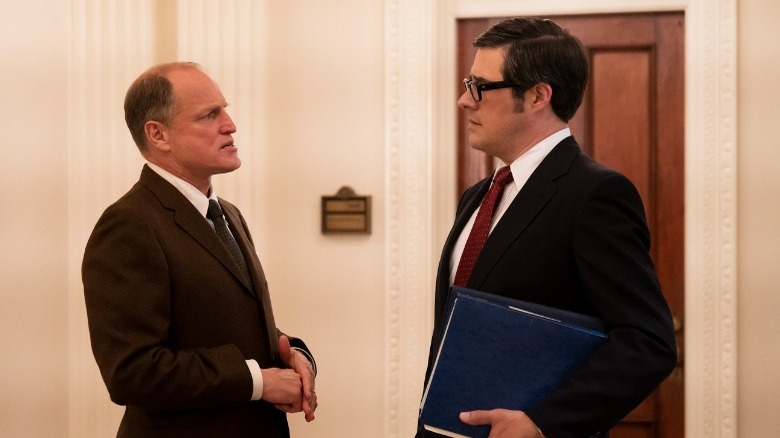White House Plumbers Adds Humor To The Already Wild History Of The Watergate Scandal
This article contains spoilers for "White House Plumbers."
The strangest thing about the latest HBO prestige drama is that it's not actually much of a drama at all. "White House Plumbers," a new miniseries starring Justin Theroux and Woody Harrelson that debuted this week, is actually a political satire from the minds of "Veep" writers Alex Gregory and Peter Huyck. But while "Veep" was funny, "White House Plumbers" is so far just "funny," a show with a first episode that takes weird, big comedic swings that mostly — and sometimes painfully — miss.
The dissonance between what "White House Plumbers" seems to be trying to do and what it's actually doing is apparent from very early on. In the cold open of its first episode, the show presents a group of men who seem to be about to pull off the Watergate break-in, a historic attempted wiretapping of a Washington D.C. office building that ended up resulting in President Nixon's resignation. When they get to the door of the room in question, though, the crew realizes they have the wrong tools. D'oh! These guys are no Ocean's 11!
Most of the comedy in "White House Plumbers" feels misguided, in part because the true story of the Watergate scandal is goofy enough as it is without turning its major players into utter cartoon characters. "Bungled" is a word that comes up a lot in coverage of the group of fixers who reportedly worked in Nixon's best interests to stop classified leaks (and take on some side quests) in the early 1970s. The group bungled several attempts to get into the Watergate building, and when they were caught, it was because their lookout was distracted from watching a movie called "Attack of the Puppet People," per The Washingtonian.
Watergate was goofy, but this show is goofier
The attempts to cover up Watergate and the investigation that followed featured equally wacky details, including but not limited to the public's introduction to "Deep Throat," Nixon's "I am not a crook" speech, and G. Gordon Liddy's memorably damning request for an easel on which to draw out his super-secret plans. It's not unusual for the team behind "White House Plumbers" to be drawn to a comedic angle for this story; after all, the post-Watergate era was a boom period for political humor and skepticism towards America's authority figures.
"White House Plumbers," though, doesn't rely solely on the real humor of history but instead amps up the goofiness to a near-farcical level. The first time he speaks, Theroux's Liddy is using a ridiculous accent, immediately signaling just how unserious this mustachioed man is. Harrelson's character, former CIA officer E. Howard Hunt is portrayed as a right-wing blowhard whose fist-waving fits of anger are played off as ineffectual and silly. "God damn Jane Fonda!" he declares at one point after declaring that the country has "gone to hell in a handbasket." In another scene he yells at his son after finding a copy of TIME magazine on his floor, calling it "leftist propaganda." The limp punchline here is that the family subscribes to the magazine. Hunt will likely remind many of us of real old-school Republicans in our lives, but not in a way that particularly evokes laughter.
It's hard to make hatred funny
So far, "White House Plumbers" isn't that funny, but it also simply feels as if it's coming at the wrong time. The downfall of Nixon's presidency may seem comfortably distant from our own political turmoil, but the undercurrent of casual hatred coursing through the men responsible (or at least the HBO versions of them) feels all too familiar for modern audiences. In the pilot episode's most excruciating scene, Hunt and his wife (Lena Headey) visit Liddy and his wife's (Judy Greer) house for dinner, and Liddy begins casually playing a vinyl record of one of Hitler's speeches while the group sits around.
The record is deafening, and the scene seems to go on forever, with each character attempting to talk over the genocidal dictator's shouted declarations. The fictionalized version of the Hunts seem bothered, but they don't leave. I cannot for the life of me figure out which part of this scene we're meant to laugh at, but I get the feeling that viewers are supposed to laugh.
Don't get me wrong, parts of the Watergate scandal are funny, just as parts of America's more recent political tribulations can be funny. In a post-Trump world, though, there's something exhausting about watching a group of powerful, dangerous, bumbling men fail upward. To me, it feels like a miscalculation for the series to ask us to laugh at their mistakes without putting much thought into the deeply unfunny radicalism that seemed to motivate them. In its first pass at capturing the story of the Watergate scandal, "White House Plumbers" goes a bit too broad in its humor, and makes the actions of some deeply shady real-life people seem cartoonish in the process.
"White House Plumbers" airs Mondays at 9 p.m. ET on HBO and HBO Max.


